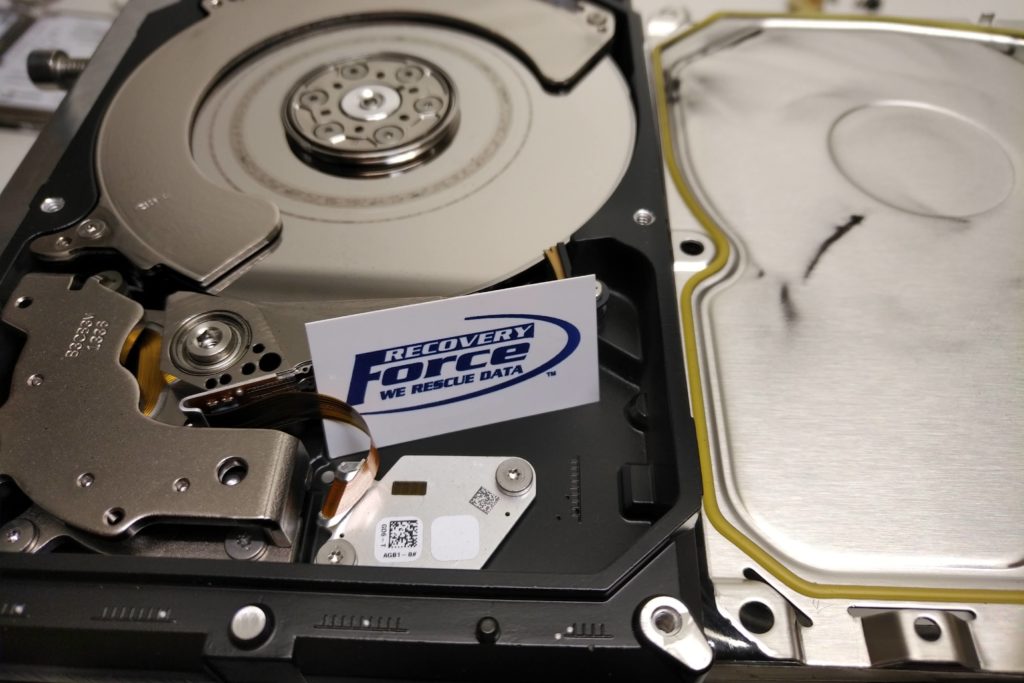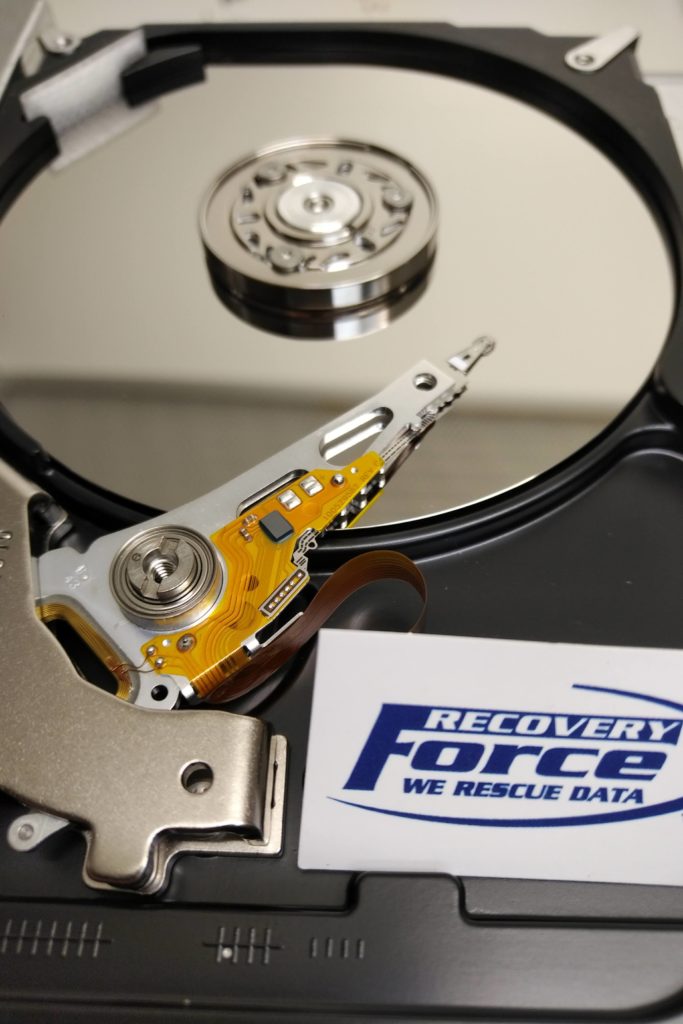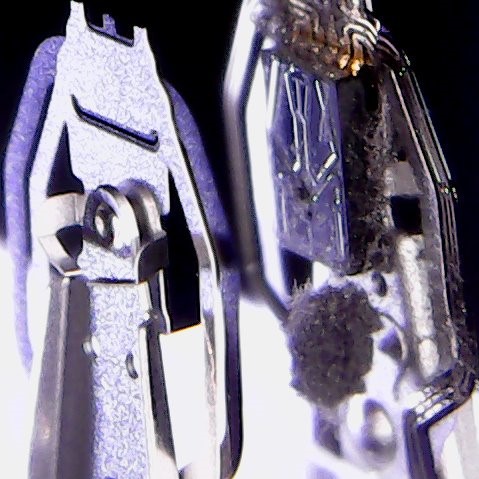Thanks to our friends in Hollywood and the marketing of several large data recovery labs, many of our clients are confused about the capabilities of professional data recovery services. When a drive is completely destroyed on TV, the super geek comes to the rescue and with a microscope, some solder and a USB adapter, they quickly recover all the top secret data within minutes of getting hold of the hard drive fragments. Yet, when a single file is deleted, various major data recovery labs swoop in with their high pressure sales teams who not only tell the client that they are the only lab in the world who has the capabilities to handle their case, they feel it necessary to say that it will all be handled in a space age clean room by trained data recovery engineers using data recovery equipment only they possess.
What is the truth?
Can data always be recovered no matter how severe the damage?
The truth is, hard drives fail. They fail every day. For those of you who are thinking, “I’m okay, I use a solid state drive,” don’t be so sure of your self. They fail daily, too. Whether or not they can be recovered depends on several factors:
Are the sectors holding the files unaltered? If the files to be recovered were overwritten with new data or encrypted by a ransomware virus, there is little that can be done to recover those files…with the exception of paying the ransom to decrypt the files.
Is the media holding the data still intact? For a hard drive with spinning platters, the data is stored on the surface. If the surface is scraped off, there is nothing left to be recovered. In the case of solid state drives and flash media (camera cards and thumb drives), the memory chips can fail because they are low quality or they can be physically damaged by being broken in half or just cracked (less likely with a solid state drive)
Is the firmware accessible and/or fixable? This is the part of the storage device that holds all the unique low level details of how the data is to be stored on the drive. There are times when this data is damaged to the point that it is impossible to gain access to the user data stored on the storage drive. This holds true both for hard drives and solid state drives.
So, if the sectors are unaltered, the media holding the data is relatively intact and the firmware is healthy and/or fixable, data is usually recoverable in whole or in part.

Fatal Head Crash Data Not Recoverable
Are there really only one or two labs in the world with the technology to recover data from failing hard drives?
First off, there are likely a lot more professional data recover labs around the world than what most people are aware of. Some are small one-man shows running from home, while there are others with large facilities with a large workforce. As the larger labs tend to charge considerably higher prices, they also have more money to invest in marketing, which is usually why only a handful of labs appear to exist when searching online. Many assume that because a data recovery lab is larger and charges more, they must be better at doing data recovery. While there are always examples where this might be true, there are plenty of cases where it usually isn’t true.
The big labs only hire trained data recovery engineers. I actually had a discussion with a lab about that very statement they made while talking with me. When I asked where they got their training, the response was, “we trained them.” When I asked about the engineering titles, the response was, “they come to work their with a pre-existing engineering title from other industries (ie, Computer engineer, Electrical engineer, etc). So, basically, a trained data recovery engineer could be a forestry engineer who is trained to use a data recovery program. Technically, the president of Recovery Force is a trained data recovery engineer, although his training has been the past 20 years of experience and self-training and he is a Stationary (Power) Engineer.
The big labs have special platter readers and electronic microscopes. In short, they don’t really exist for modern data data recovery.
The big labs have in-house built proprietary recovery equipment that nobody else in the world has. There may be some validity in this statement for very unique custom situations. However, for 99.99% of data recovery situations, most data recovery labs around the world use the exact same equipment purchased from the same suppliers.
The big labs have the best data recovery technicians working for them. While some large labs have some very skilled data recovery technicians working in-house, some of the world’s best data recovery technicians prefer to work only on contract for multiple labs or run their own small lab, servicing their region.
The big labs can recover data that nobody else can. While they are very good at saying this, it is far from true. All labs have cases that they may not be able to recover that may be recoverable by others, mostly because a different technician might see things differently. Sometimes it is pure luck. We have recovered many projects that were called unrecoverable by some of the larger labs. In some cases, the larger labs have charged the clients large amounts for very partial recovery recoveries and we were able to recover significantly more, if not all of the data, for significantly less. But, again, that isn’t always the case. Larger labs have more resources to invest into a project while smaller labs have more to gain by recovering a single project.

Head Stuck to the Platter Fully Recoverable
How to know who to trust?
As always, there are exceptions to the rules. Here are a few things to watch for:
Do they have an address on their website that is a real lab location? The latest trend with some labs is to use virtual offices and UPS stores as though they are full service lab locations, trying to trick their clients to think that they are dealing with a local business. Yet, when you look at their website, there is no way of knowing if they are even a real lab or a dude in his underwear sitting in his mother’s basement redirecting packages to someone else somewhere in the world for a commission.
This isn’t to say that a home based business who partners with a larger lab is a bad thing. Years ago, that was us. The difference is that we were up front about where we worked, what we did in-house and what we were outsourcing to a larger lab.
Are they trying to oversell themselves? Some sales reps seem to be trained to say whatever it takes to get the client to send them their drive, knowing that once they have it there, they have a better chance of convincing them to pay for the recovery, even if it is at an insanely high rate. It is nice to know if a lab has a clean room…most do. But, if they keep pushing their clean room certification level and how white their teeth are, they are probably pushing a little too hard, suggesting that you will be paying a lot more for that sales rep and his/her family’s white teeth.
That said, some technical details in the quote can be helpful to the client to help them appreciate that data recovery is not as simple as they had hoped.
Do they have good online reviews? Believe it or not, I stumbled upon 3 different data recovery labs with different websites and phone numbers, yet had the same chat window, same virtual office addresses and even the same video testimonials right on their sites. Wait, not the exact same testimonials. Just the same people giving the same testimonials in different recordings, saying the name of the company website on which the video was showing. So, it is better to take the company posted reviews with some skepticism and look at other sources such as google and facebook. That said, some labs will go out of their way to offer their clients discounts or gifts for positive 5 star reviews. I’m sure that an unsatisfied client is not going to post a 5 star review, but a 3 star client might bump it up just to get the kick back.
I’d be remiss in not flipping the coin and stating that sometimes negative reviews can be faked or unreasonable. We had a client post our only negative review based on the fact that we would give them a discount after we were able to recover all but 1 file 100% clean. The one file wasn’t even one they wanted. But, they said that the recovery must have been easier than expected and therefore we should have charged less than quoted. And, of course, we have a review from someone in India who has never used our services who just posted a random 3 star review on Facebook. If it happens to us, it surely happens to others, so do keep that in mind.
Are you able to communicate with a technician directly? Although not a necessity, it is always nice to be able to talk to someone who actually knows what they are talking about. Sales people tend to be spoon fed what they need to know, while a technician might be able to directly answer the question you might have right away.
Please take note that just because technicians are accessible, it is always best to start with the person who answers the phone. They should be equipped to answer most of your questions and know when to redirect your call when the conversation starts to gravitate beyond their knowledge. The less time the technician is on the phone with clients, the more time they can focus on getting your recovery completed.
Do they have a good ticketing system? There is something reassuring about knowing that you can log into a website with a personal username and password and see a list of all your data recovery projects past and present, whether it be one job or 100. It is nice to know that you can quickly fill in a form online, get a ticket number and know that when you ship the drive, labeled with the ticket number, they will be not get it confused with another client’s project. It is helpful to be able to log in, make a few changes to the list of files that you need recovered, enter a note for the technician working on the case to read and get notes back, directly from the technician. And, for those who might have more than one project at a lab at a time, it is really nice to be able to quickly differentiate which project is which so you can relay details back to your own client.
This certainly doesn’t define the lab or its capabilities. Some of the larger labs only communicate via the sales rep on the phone. Some just give a link which shows a status update like the Domino’s Pizza Delivery website. Some smaller labs are limited to a spreadsheet or a pad of paper. At the end of the day, the results of the recovery are what matters.
Up front, posted pricing? While it would not make sense for all labs to use a flat rate pricing model like Recovery Force, it would be helpful, at the very least, to post the price ranges one could expect. Most labs don’t post any pricing because they want you to call and allow their sales team to do their pitch, knowing that most people would never call if they knew how much it was going to cost. My main concern for the open price range is that it is very subjective and always makes the client wonder if they being quoted fairly based on the recovery or based on how much the sales rep feels they can charge without my declining the quote.
What is the point of this blog post?
To be honest, the post was supposed to just show that some drives are worse than expected or hoped for (the first image of an opened hard drive above) while others aren’t as bad as expected and are fully recoverable within our minor data recovery service level pricing (2nd picture of an open drive with heads stuck to the platter). Looking back, it is clear that I may have deviated a little. Perhaps, at the very least, it will help readers get a better glimpse into the world of data recovery. Even better, maybe it will help educate people in knowing that they don’t have to pay thousands of dollars for data recovery, just because a sales rep told them that their lab was the only option. Let the world know that there are other options, like Recovery Force, who try to remove the smoke and mirrors and even go so far as to post pricing right on our website.
Questions?
If you’d like to know more about Recovery Force and how we can assist you with your data recovery needs, feel free to reach out to us with your questions. There are several different ways you can use to communicate with us:
Phone: 866-750-3169
EMail: info@recoveryforce.com
Facebook: https://www.facebook.com/RecoveryForce
Twitter: https://www.twitter.com/RecoveryForce
Online Data Recovery Forums: https://www.recoveryforce.com/forums
And, of course, if you want to start the procedure to send a new data recovery project our way, you can start by creating a new user account (first time clients) followed by a new ticket on our support site, https://support.recoveryforce.net

I have referred several clients to Recoveryforce over the years. They all reported back they were very happy. Doug’s team is always my go to for lost files. He was even able to recommend a clean room company to fix a particularly difficult drive that was extra broken. I appreciate their approach and honesty during times when my clients were under extreme stress.
Although I am thrilled with your very kind comment, my conscience, sadly, is forcing me to clarify that Luke is the one who is the technical guru who magically recovers the data and runs the business now. I am just the kind, generous and wise support behind the scenes. 🙂
With clients it is often the case that they expect miracles. It’s best for free. It is not that the client does not want to pay at all … but the client will pay much for the office and white teeth of the salesperson much more than for the laboratory and specialist knowledge. Besides, customers like to be cheated. That’s why they often choose who promises more. If you fail to recover eg overwritten data, they will say that you are unprofessional. For many years, only once happened to me that such a customer returned to apologize.
When it comes to learning – only recently there are courses available where you can learn to recover data. I do not know any university where one could be a data recovery engineer. Among people dealing with data recovery, you can meet many electronics and IT specialists, but also mathematicians, physicists, chemists … Among my colleagues dealing with data recovery is also a car mechanic, construction technician, doctor of law and violinist. Yes – you can also recover data after finishing the art academy 🙂
Tools all have similar. The difference is when it is not enough to follow the instructions. In large laboratories, in such situations, there is often a manager who states that it does not pay off and makes the specialist take care of another job. In small laboratories, where there is no manager guarding investors’ money, such cases have a better chance of being resolved.
This is also one of the reasons that specialists prefer to work in smaller companies. I had an offer to work from a large laboratory, but after reading the terms of employment, I found that it would be a regress for me.
The data recovery market seems to be everywhere, with many intermediaries and few subcontractors. I can not say it is bad. I have more than half of the work from intermediaries. The problem is when the chain of intermediaries is too long, the price increases, because everyone has a margin, and the responsibility is blurred and contact with the client is more and more difficult. If the intermediary chain is short, I can call the customer directly and introduce myself as an intermediary, but if the medium passes through the hands of 5-6 intermediaries, it is already difficult.
When it comes to opinions on the Internet … rarely a client will write something positive about himself. He believes that the positive result of the service belongs to him. Without stimulation, the opinion will be written only by the unsatisfied customer. Very often it will be emotional and clearly negative opinion. A dissatisfied customer is unable to see anything positive in what you do for him. Often you are a bad man for him who must be destroyed at all costs. But the largest group of pine trees is the opinions bought. There are many companies specializing in writing custom-made reviews in Poland. You can buy positive reviews for yourself or negative for the competition. You can often buy reviews for less than half a dollar. That is why it is easy to get a negative opinion from someone you have never served.